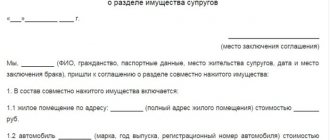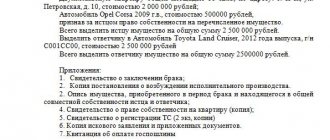Types of collateral
Article 140 of the Civil Procedure Code of the Russian Federation establishes a list of interim measures. When dividing jointly acquired property, the following measures are applied.
Arrest
It is imposed on property registered in the name of the respondent spouse. This can be either movable (car, furniture, etc.) or immovable property (apartment, plot of land, etc.). This encumbrance also applies to funds, cash or bank deposits.
In this case, the seized item may be in the use of either one of the spouses or other persons.
Prohibition to carry out specific actions
The defendant is not allowed to carry out a number of procedures during the period of restrictions. As a rule, these are any manipulations that are aimed at alienating a thing (purchase and sale, donation, etc.) or its damage or destruction (disassembly, dismantling).
Prohibition of other persons to carry out actions related to acquired and subject to division of marital property
The ban may apply to actions that could lead to damage or destruction of the item. In addition, a prohibition may be imposed on transferring property to the defendant or fulfilling any obligations.
An example from judicial practice
Petrov A.P. borrowed money from the Valuev spouses in the amount of 500,000 rubles. The transaction was formalized with a receipt issued only in the name of O.D. Valuev’s husband. After some time, the couple decided to divorce. When filing a claim for division of property, Valuev’s wife A.B. filed a petition for security.
The court imposed restrictions, prohibiting Petrov A.P. return the borrowed money to the defendant O.D. Valuev, who was listed on the receipt. The motivation for this decision was that these funds are family funds. Returning them only to the husband may complicate the division in the future.
- Property that is pledged cannot be seized.
- The court has the right to apply one security measure or several at the same time.
How to seize property during a divorce?
For an apartment
It is allowed to carry out interim measures only for real estate that is the subject of a legal dispute. When filing a claim, the plaintiff does not have the right to demand seizure of an apartment that is not included in the division of common family property.
If there are reasonable suspicions that the spouse’s apartment was purchased with common money, it is necessary to further substantiate your position.
The process of imposing security measures on an apartment is as follows:
- the plaintiff files a statement of claim for divorce indicating the requirement for the division of jointly acquired property;
- pays the state fee - in isolated cases, depending on the financial situation of the party, he may be exempt from paying this amount;
- it is necessary to wait for the court's decision to accept the claim for consideration. It is from this moment that a preliminary arrest of the apartment can be demanded;
- a motion to take measures can be made orally at the time of the first hearing (the judge is required to ask questions about a possible challenge and the presence of motions).
Basic rules for seizing an apartment:
- you cannot simply say that there is an apartment that should be seized. The property must be individualized - that is, it is advisable to indicate the exact address and, if possible, registration number;
- if an apartment is seized where spouses have common shares, both cannot dispose of the property on an equal basis;
- It is impossible to restrict residence in an apartment if a minor child or other person with limited legal capacity lives there.
A request to impose security measures on an apartment can be resolved within a few days. If the petition is filed during the court hearing, the judge will be required to retire to the deliberation room to make a decision. The defendant has the right to appeal the seizure of the apartment.
We recommend that you always appeal against the imposition of security if the following circumstances exist:
- the apartment (other real estate) was purchased with funds earned before marriage and cannot be included in the common family asset subject to division;
- the apartment was donated by one of the parents. According to family law, property received as a gift is personal and is not considered joint;
- an apartment received by inheritance during marriage also cannot be included in common joint property;
- the plaintiff erroneously indicated the details of the apartment: he made a mistake with the address, area and other distinctive features that would prevent the individualization of this property;
- securing a claim may violate the rights of other owners of the specified real estate (for example, if shares in the apartment belonged not only to spouses, but also to third parties - parents, brothers, sisters, etc.).
If at least one of the above signs occurs, there is a high probability that the court’s ruling may be overturned in the cassation court. The judge can independently revoke his ruling if the defendant proves that the petition is intentionally misleading (falsification of facts, incorrect data, false documents were used when filing the claim, etc.).
Security for the apartment will be held until a court decision is made. Remember another common mistake.
The cadastral authority can remove security only if this is expressly stated:
- in a court decision;
- a separate determination was made.
Without indications of this in the document, even if the court rules against the plaintiff, you may encounter temporary problems.
Be careful at the stage of receiving the decision and writ of execution - there must be an exact indication of the lifting of temporary measures to seize the apartment.
For car
To register your application, please provide the exact registration details of the vehicle: license plate number and who owns it. Unlike real estate, a car cannot have more than one owner.
When considering the petition, the court will definitely pay attention to the year the car was received into ownership (data from the technical passport). Does the date of acquisition coincide with the date of marriage? In other words, a car cannot be purchased by spouses before the date of marriage.
A vehicle restriction may have the following conditions:
- ban on traveling abroad;
- prohibition on operating a vehicle in the interests of both spouses;
- restrictions on sales, rentals or other transactions for consideration.
The car may be placed under temporary storage in a impound lot. Security functions will rest with the bailiff.
For household items
The general rule applies - it is impossible to seize things that are the personal property of each spouse:
- items of clothing: coats, fur coats, raincoats and other outerwear;
- children's toys;
- tableware (except antique);
- items of costume jewelry (except jewelry).
The procedure for imposing an encumbrance
The court has the right to arrest or impose other restrictions at any time before it makes a decision. To do this, the interested person must submit a corresponding application. You can do this as follows:
- Directly in the text of the claim.
- A separate document along with the application.
- By an independent petition at any stage of the consideration of the case, before the court retires to the deliberation room.
The state fee is not paid when filing a request for arrest.
The court is obliged to consider the petition and make a decision on it on the day it is received. In this case, neither the husband, nor the wife, nor third parties are subject to summons. The court makes a decision alone.
If the petition is satisfied and the seizure is imposed, the corresponding decision is sent to the plaintiff and defendant. Also, the court immediately sends it to all registration authorities - Rosreestr, traffic police and other authorities. It is also sent to bailiffs.
Sample petition to seize a car
Name of the court
Details of the plaintiff and defendant
Application filing date
Based on the filed statement of claim, the plaintiff asked to dissolve the marriage concluded on (specify date). As part of the division of jointly acquired property, the plaintiff suspects that before the case is considered on the merits, the defendant may abuse his right and dispose of movable or immovable property in his own interests. The property in question was acquired during the marriage.
To ensure the integrity of the property at the time of the decision, I ask the court to provide a claim, namely to impose a ban on the possibility of alienation or other disposition of the following property (list of jointly acquired property).
Dear readers! To solve your problem right now, get a free consultation
— contact the on-duty lawyer in the online chat on the right or call:
+7
— Moscow and region.
+7
— St. Petersburg and region.
8
- Other regions of the Russian Federation
You will not need to waste your time and nerves
- an experienced lawyer will take care of solving all your problems!
Contents and required documents
When drawing up an application, the following data is entered into its form:
- Name of the court.
- Parties to the case – full name, contact details.
- The title is “Petition to secure a claim.”
- Brief summary of the essence (“A case regarding the division of property is pending before the court” or “A claim for division has been filed”).
- Justification for the need to seize (“Without these measures it will be impossible or extremely difficult to execute the decision”). If there is information that the spouse is trying to alienate something from the joint property, evidence of this must be attached. For example, a screenshot of an advertisement for the sale of a car from the corresponding website.
- A list of specific property for which the plaintiff requests to be seized.
- Justification that this property is jointly acquired and subject to division.
- Demand to seize.
- Date, signature.
An example of a petition will be below in the article.
When a request for security measures is supposed to be stated in a statement of claim, this is done as follows:
- The text directly indicates the need to apply encumbrances.
- The property objects planned for interim measures are listed.
- In the pleading part of the claim, a separate paragraph sets out the demand for seizure.
It is highly advisable to attach documents confirming the rights to the property to the application. However, if they are not in hand (the other spouse does not give them) and it is impossible to obtain them on your own, then taking into account judicial practice, interim measures may be applied even without documents.
To do this, the property must be clearly identified in the application. That is, if this is real estate, indicate its name, address, location, area, cadastral number. In case of seizure of a car - its make, model, registration plate.
You can submit an application:
- In person, through the court office.
- Sent by mail.
- By filling out a special form on the court’s website, sealing it with an enhanced electronic signature.
If the situation is such that it is necessary to make an arrest as quickly as possible and prevent the unscrupulous spouse from reregistering family property, it is better to submit the petition in person. In this case, it will be immediately registered and sent to the judge. Throughout the day, the application will be considered and a decision will be made.
Interim measures for the division of marital property
What is the court guided by when satisfying measures to secure a claim:
there is a real threat that the property will be sold. Cases are considered in court for at least several months; at this stage there are no difficulties in implementing the disputed object. Please note that according to current legislation, a spouse, when selling joint property, acts a priori with the consent of his other half. In most cases, when selling a shared apartment, a notary requires the presence of a husband or wife. But this procedure is more of an insurance option;- The plaintiff presents convincing arguments that the property will pass into the hands of a third party as a result of fictitious transactions. For example, when transferring an apartment for rent or rent for free for up to 49 years. Formally, the property has been preserved, but the defendant has already encumbered it with the rights of third parties.
In order to avoid the development of the negative circumstances mentioned above, the judge not only seizes the property, but also in the ruling indicates a ban on leasing, free use or other encumbrances.
However, when imposing security measures, the law can also be on the side of the defendant.
For example, the plaintiff misled the court and asked to seize property on an apartment that had nothing to do with him.
The property was gifted to the spouse prior to the marriage and cannot be included as a joint asset.
The seizure caused property damage to the spouse: denial of the opportunity to exercise her property rights and use her property for its intended purpose. The court that imposed the security will not be held liable.
The plaintiff who misled the court will be required to compensate for all related losses.
Appeal
When the defendant receives an arrest warrant, he has the right to appeal it. He is given 15 days to do this from the date of receipt of the decision.
It makes sense to file a private complaint when the defendant’s sole property is seized. For example, for a house that he received under a will or as a gift. Since such property is not subject to division during a divorce, its seizure infringes on the rights of the defendant. Evidence must be provided to support the arguments presented.
A private complaint is filed with the same court that imposed the encumbrance. It is reviewed by a higher authority.
Filing a complaint does not in itself cancel interim measures. They begin to operate from the moment the decision is made.
Consequences of interim measures
When the court imposes security measures, the defendant does not have the right to dispose of the encumbered property. He will not be able to make a transaction with it that requires registration.
So, he may try to sell or donate a jointly owned apartment or car. When submitting documents for registration to Rosreestr or the State Traffic Safety Inspectorate, they will not be accepted. The transaction will not be registered.
In this case, such an unscrupulous spouse who violates the court decision is subject to a fine in the amount of 1,000 rubles.
Cancellation of arrest
Interim measures remain in force until the end of the proceedings. The following features are available:
- If the claim is rejected, the arrest is valid until the decision comes into force, but the court, when making it or after that, can cancel the security measures.
- If the demands are satisfied, the arrest remains in force until the decision is fully implemented. For example, if an apartment is divided, then until its part is re-registered in Rosreestr to the wife, the encumbrance continues to apply.
Also, security measures can be canceled if one of the parties requests it or on the initiative of the court. This is permissible at any stage of the proceedings.
In this case, the plaintiff and defendant are sent summonses to resolve this issue. If they do not appear, the court will consider the petition and make a decision without them.
When the arrest and other encumbrances are cancelled, the registration authorities are immediately informed about this. This decision can be appealed by the dissenting party.








